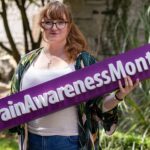Study Title: “Are we there yet?” – Emerging Adulthood (18 – 25 years) and Living with a Long-Term Physical Condition
Please read and carefully consider this information leaflet before deciding on whether to take part.
Who is conducting this study?
My name is Orla Mooney and I am a student at Dublin City University. I am currently doing my PhD research under the supervision of Prof. Pamela Gallagher (School of Psychology, DCU) and Prof. Veronica Lambert (School of Nursing, Psychotherapy and Community Health, DCU). If you have any questions before deciding to take part, you can contact me by email at: orla.mooney7@mail.dcu.ie
What is this study about?
We are doing this study to find out about the period of emerging adulthood (18-25 years) and living with and managing a diagnosed, long-term physical condition during this time. Emerging adulthood is a period that can have many life transitions for a person, such as, being legally an adult, starting employment, continuing in education, moving away from home and moving to adult healthcare.
Am I eligible to take part?
You are eligible to take part if you are aged 18 to 25 years of age, can read and write English, and are able to complete the online questionnaire yourself.
We are including people with and without a long-term physical condition
*A long-term physical condition is a condition that has been diagnosed by a medical professional, has lasted 6 months or more and requires some ongoing treatment (e.g. medication, GP visits, therapies).
Examples of long-term physical conditions include: diabetes, cardiovascular (e.g. hypertension), chronic respiratory (e.g. asthma), chronic neurological (e.g. multiple sclerosis, epilepsy), chronic pain (e.g. arthritis, fibromyalgia), other long-term conditions (e.g. chronic fatigue syndrome, irritable bowel syndrome) etc.
If I decide to take part, what will I be asked to do?
You will complete an online consent form and then proceed to fill in an online questionnaire. The questionnaire should take approximately 10 – 20 minutes to complete. All participants complete demographic information, what the experience of emerging adulthood is like, and social support and self-regulation. If you have a long-term physical condition, you will be asked some additional questions on managing your long-term physical condition. The information provided by you will be anonymous and no identifying information (e.g. name, email) about participants is being requested.
Your participation and data confidentiality
1. As participation is completely voluntary, you are free to withdraw from the study at any time for any reason without explanation. However, as the data gathered is anonymous once you submit your response to the online questionnaire it will not be possible to change your mind because your data cannot be identified from the other participants.
2. Information collected during the study will be anonymous, remain strictly confidential and in compliance with GDPR (participants cannot be identified from the information collected). Only the research team will have access to the data and both the data and the results are anonymised. The data is being processed for legitimate purposes – see Article 6 and 9 of the General Data Protection Regulations 2016, if you are uncertain you can contact the researcher Orla Mooney or DCU Data Protection Officer – Mr. Martin Ward (data.protection@dcu.ie Ph.: 7005118 / 7008257).
3. In relation to the Freedom of Information Act, as the data is anonymised, you cannot be identified as an individual participant, therefore information cannot be requested under this act.
Are there any benefits associated with my participation?
Although there are no direct benefits from taking part, this study will contribute to understanding what it is like to manage a long-term physical condition during emerging adulthood (18 – 25 years), inform future healthcare and healthcare professionals on how to tailor supports and add to the overall knowledge of emerging adulthood.
Are there any risks associated with my participation?
Risks are not expected from involvement in this study. In the unlikely event that your participation in the study adversely affects you in any way, please consult the following support groups.
• Jigsaw https://www.jigsaw.ie/
• SpunOut https://spunout.ie/about
What will happen with my data and how will it be disposed of?
The data collected for this survey will be summarised and will be presented in a PhD thesis to be submitted to DCU. The anonymised data may also be published in journals or reports, or presented at conferences. The anonymised data will be stored on the researcher’s encrypted laptop and all electronic files will be permanently deleted after five years or after all the findings have been published.
Is there anything else I need to know?
If you wish to find out the outcomes of the study, you can contact the research team following the completion of the study. If you would like to chat with me with any questions you may have about this research my contact details are: Email: orla.mooney7@mail.dcu.ie
If participants have concerns about this study and wish to contact an independent person, please contact:
The Secretary, Dublin City University Research Ethics Committee, c/o Research and Innovation Support, Dublin City University, Dublin 9. Tel 01-7008000, e-mail rec@dcu.ie















